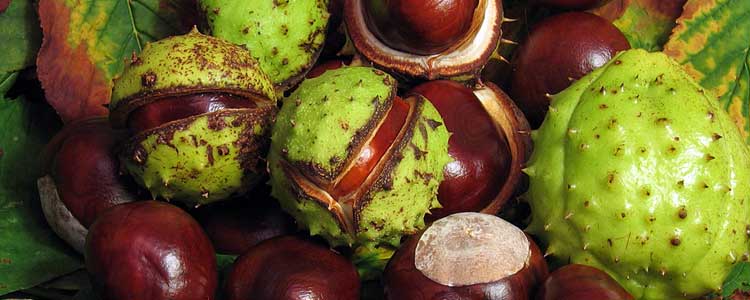 Varicose veins are essentially veins that are bulging. Even though complex varicose veins might have to be something that many would deal with surgically, there’s natural therapy options available for mild to moderate cases. One of those options is horse chestnut.
Varicose veins are essentially veins that are bulging. Even though complex varicose veins might have to be something that many would deal with surgically, there’s natural therapy options available for mild to moderate cases. One of those options is horse chestnut.
In Germany, horse chestnut is a significant topic of interest and has been since the 60s. Their research has resulted in the creation horse-chestnut seed derived natural therapeutics for vein disorders of the legs including cramping, swelling, redness, spider and varicose veins.
Horse chestnut extract is in common use in Europe to help with a problem called chronic venous insufficiency, and with problems with varicose and spider veins. It’s been proven to reduce leg pain and enhance circulatory function in persons with this particular issue. It’s as powerful as support stockings are in removing liquid from your calves. Therefore, it’s a synergistic cardiovascular support nutrient that improves your complete circulatory structure and function. To know how horse-chestnut might help, let’s start by understanding the way the veins in your legs function.
Medline Plus on Horse Chestnut for Varicose Veins
Medline Plus, a service of the NIH, considers horse chestnut to be “likely effective” in treating varicose veins. Though this might seem like a put-down, it is very rare for the NIH to provide such a statement to any nutritional supplement of effectiveness. Many, many studies are required prior to the NIH approaching a stronger sign of acceptance for a botanical medicine. Every research thus far has showed that the herb alleviates symptoms of varicose veins. However, several more are necessary for the signs to be considered conclusive.
How Our Leg Veins Work
Arteries send out oxygenated blood from the heart to the legs. The veins carry the blood, now without oxygen, back to the heart. It then sends that blood to the lungs to become oxygenated again. Superficial veins lie near the skin. They are called varicose veins if they get enlarged and twisted.
Also, our body’s have perforating veins, which link the superficial veins to the deep veins. The deep veins lie in sets of muscles and so will be the primary workhorses that pump the blood back up to the heart. The circulation of blood upwards is pushed by muscle contractions, pressure, and valves that prevent blood that’s moving up from returning down.
How Horse Chestnut Works
Horse-chestnut extract functions in several methods to support the wellness of the veins and capillaries. It’s a direct tonic material for valves and veins, a supply of nutrition that improves their structure. It’s been proven to close small gaps in veins that permit fluid leakage that leads to edema. Along with its structural support for veins and valves, the benefits of horse chestnut contain a function that helps to regulate certain capillaries and veins within the body. Its actions are exceptional and intriguing.
The seed extracts of horse chestnut help to relax the lining of capillaries, which in turn contributes to reducing inflammation. This will typically help the arteries in the form of lower blood pressure. Additionally, it helps seal up capillaries that leak an excessive amount of water to the tissues, which helps decrease edema.
Horse Chestnut helps the structural integrity of valves and veins while also boosting the pressure in the body’s veins for them to pump blood better against gravity (as opposed to the effect on capillaries). The combination is a unique blend of benefits that are helpful for leg circulation.
Dosage Advice
It is suggested that one use horse-chestnut extract in a time release based supplement. Taking one dose of between 100-200mg with breakfast and one at supper, with considerable fluids, is the most suggested dosage.
Warnings About Using Horse Chestnut
Horse chestnut might be unsuitable for some individuals with varicose veins. For instance, its impacts on pregnancy and lactation haven’t been adequately investigated. Therefore, no one knows if it might damage a fetus or baby through breastfeeding. The NIH advises that if you have a digestive disorder, liver disease, or kidney disease that they should not be using horse chestnut. It is suggested that the herb can cause difficulties in folks who are allergic to latex, and as such they shouldn’t take it as well.
Horse chestnut is safe and advantageous for treating varicose veins, along with associated illnesses like spider veins, hemorrhoids, and general swelling of the legs. Nonetheless, it’s wise to talk with your doctor prior to taking any new herbal over-the-counter substance. Your doctor will be able to help you decide if horse chestnut is a feasible treatment alternative for you.
